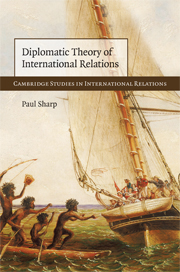Book contents
- Frontmatter
- Contents
- Acknowledgements
- Introduction
- Part I Traditions of international thought and the disappointments of diplomacy
- Part II Elements of a diplomatic tradition of international thought
- Part III Diplomatic understanding and international societies
- 6 Using the international society idea
- 7 Integration–disintegration
- 8 Expansion–contraction
- 9 Concentration–diffusion
- Part IV Thinking diplomatically about international issues
- Conclusion
- Bibliography
- Index
- Cambridge Studies in International Relations
8 - Expansion–contraction
Published online by Cambridge University Press: 05 June 2012
- Frontmatter
- Contents
- Acknowledgements
- Introduction
- Part I Traditions of international thought and the disappointments of diplomacy
- Part II Elements of a diplomatic tradition of international thought
- Part III Diplomatic understanding and international societies
- 6 Using the international society idea
- 7 Integration–disintegration
- 8 Expansion–contraction
- 9 Concentration–diffusion
- Part IV Thinking diplomatically about international issues
- Conclusion
- Bibliography
- Index
- Cambridge Studies in International Relations
Summary
It remains very easy to think of the world as primarily constituted by a single international society of states. We may argue about aspects of this claim: who may properly be regarded as its members; the nature and strength of the ties with which it binds them together; and, above all, the part it plays in explaining what happens. Yet there it seems to be, everything of consequence within it and nothing much without. For academics, this ubiquitous quality and its historical provenance are definitively portrayed in Bull and Watson's edited work, The Expansion of International Society. The editors' focus is on how the organizing principles of European relations became principles for the whole world. Through processes of conquest, colonization and, finally, a distinctive form of decolonization, a global international society of sovereign territorial states bound by international law, diplomacy, war, great powers and the balance of power principle emerged in Europe's image. The stories told in the Bull and Watson volume may be criticized on several grounds. The focus on Europe puts the rest of the world out of focus. It oversimplifies the story of the expansion. And, perhaps, in doing so, it implies – nothing stronger – that with the consolidation of the European society as a global international society, the history of international societies came to a full stop.
However, these shortcomings are less significant than two contributions the volume made. The first was to see international societies as historical phenomena with life cycles of their own.
- Type
- Chapter
- Information
- Diplomatic Theory of International Relations , pp. 149 - 168Publisher: Cambridge University PressPrint publication year: 2009



